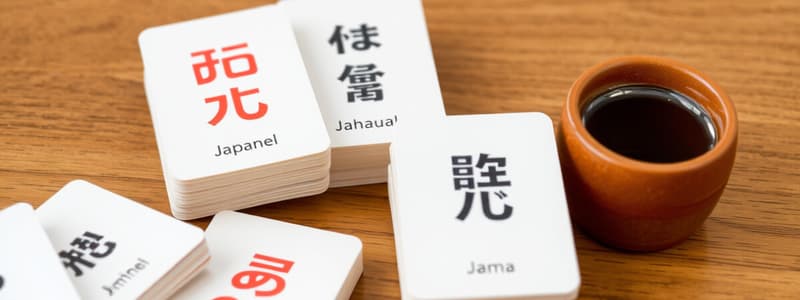Podcast
Questions and Answers
What does the word 'beneath' mean in Japanese?
What does the word 'beneath' mean in Japanese?
- 武器,兵器
- やめる
- の真下に (correct)
- 空想
What is the Japanese definition of 'strike'?
What is the Japanese definition of 'strike'?
襲う
What does 'archipelago' refer to in Japanese?
What does 'archipelago' refer to in Japanese?
列島,諸島
What is the Japanese term for 'weapon'?
What is the Japanese term for 'weapon'?
What does 'quit' mean in Japanese?
What does 'quit' mean in Japanese?
What is the Japanese term for 'Shakespeare'?
What is the Japanese term for 'Shakespeare'?
What does the word 'fantasy' mean in Japanese?
What does the word 'fantasy' mean in Japanese?
What is the Japanese definition of 'depth'?
What is the Japanese definition of 'depth'?
What does 'anxiety' translate to in Japanese?
What does 'anxiety' translate to in Japanese?
What is the Japanese meaning of 'determine'?
What is the Japanese meaning of 'determine'?
What does the word 'optimist' mean in Japanese?
What does the word 'optimist' mean in Japanese?
What is the Japanese definition of 'pessimist'?
What is the Japanese definition of 'pessimist'?
What does 'think to oneself' mean in Japanese?
What does 'think to oneself' mean in Japanese?
What is the Japanese translation of 'what if ~?'
What is the Japanese translation of 'what if ~?'
What does 'like it or not' mean in Japanese?
What does 'like it or not' mean in Japanese?
What does 'put an end to ~' mean in Japanese?
What does 'put an end to ~' mean in Japanese?
What is the Japanese meaning of 'come to one's senses'?
What is the Japanese meaning of 'come to one's senses'?
What does 'subway' mean in Japanese?
What does 'subway' mean in Japanese?
What is the Japanese term for 'bullet'?
What is the Japanese term for 'bullet'?
What does 'depart' mean in Japanese?
What does 'depart' mean in Japanese?
What is the Japanese meaning of 'electronic'?
What is the Japanese meaning of 'electronic'?
What does 'signboard' mean in Japanese?
What does 'signboard' mean in Japanese?
What is the Japanese definition of 'reserved'?
What is the Japanese definition of 'reserved'?
What does 'unreserved' mean in Japanese?
What does 'unreserved' mean in Japanese?
What is the Japanese meaning of 'first-class'?
What is the Japanese meaning of 'first-class'?
What does 'passenger' mean in Japanese?
What does 'passenger' mean in Japanese?
What is the Japanese definition of 'alarming'?
What is the Japanese definition of 'alarming'?
What does 'notify' mean in Japanese?
What does 'notify' mean in Japanese?
What is the Japanese definition of 'suspicious'?
What is the Japanese definition of 'suspicious'?
What does 'unattended' mean in Japanese?
What does 'unattended' mean in Japanese?
What does 'baggage' mean in Japanese?
What does 'baggage' mean in Japanese?
What is the Japanese meaning of 'inhospitable'?
What is the Japanese meaning of 'inhospitable'?
What does 'urgent' mean in Japanese?
What does 'urgent' mean in Japanese?
What is the Japanese definition of 'comma'?
What is the Japanese definition of 'comma'?
What does 'frustrating' mean in Japanese?
What does 'frustrating' mean in Japanese?
What is the Japanese phrase for 'emergency'?
What is the Japanese phrase for 'emergency'?
What does 'silly' mean in Japanese?
What does 'silly' mean in Japanese?
What is the Japanese definition of 'stranger'?
What is the Japanese definition of 'stranger'?
What does 'mistrust' mean in Japanese?
What does 'mistrust' mean in Japanese?
What does 'in the end' mean in Japanese?
What does 'in the end' mean in Japanese?
What does 'all the way' mean in Japanese?
What does 'all the way' mean in Japanese?
Flashcards are hidden until you start studying
Study Notes
Vocabulary Flashcards Overview
- beneath: Refers to a location directly underneath something.
- strike: A verb used to describe the act of attacking or hitting.
- archipelago: A geographical term for a group or chain of islands.
- weapon: An item designed for use in combat or defense.
- quit: An action verb meaning to stop doing something.
- Shakespeare: The renowned English playwright and poet known for his significant contributions to literature.
- fantasy: A genre or concept related to imagination and make-believe.
- depth: Refers to the measurement of how deep something is; signifies intensity or complexity.
- anxiety: Emotional term describing feelings of worry or unease.
- determine: To make a decision or resolve upon an action.
- optimist: A person who tends to see the positive side of situations.
- pessimist: A person with a tendency to see the negative or adverse aspects of situations.
- think to oneself: A phrase indicating private reflection or contemplation.
- what if ~?: Used to propose hypothetical scenarios or questions.
- like it or not: An expression indicating that something will happen regardless of preferences.
- put an end to ~: A phrase meaning to stop or conclude an activity.
- come to one's senses: Refers to regaining clarity or rational thought.
- subway: An underground transportation system commonly found in urban areas.
- bullet: A small projectile used in firearms.
- depart: To leave or go away from a point.
- electronic: Pertaining to devices that operate through electronic means.
- signboard: A board displaying information, advertisements, or directions.
- reserved: Indicates prior booking or commitment.
- unreserved: Refers to availability without prior booking.
- first-class: Describes the highest quality or level of service, often in travel.
- passenger: A person who travels in a vehicle, ship, airplane, etc.
- alarming: Something that causes concern or fear.
- notify: To inform someone about something.
- suspicious: Describes a state of doubt or mistrust.
- unattended: Refers to items or spaces not overseen by an owner.
- baggage: Luggage or personal items carried during travel.
- inhospitable: Describes an environment that is unwelcoming or harsh.
- urgent: Indicates a need for immediate attention or action.
- comma: A punctuation mark used to indicate a pause or separate elements in a sentence.
- frustrating: Something that causes annoyance or disappointment.
- emergency: A serious situation requiring immediate action.
- silly: A description of something that lacks seriousness or is absurd.
- stranger: Refers to a person one does not know.
- mistrust: To have doubts or lack confidence in something or someone.
- in the end: A phrase indicating a final outcome or conclusion.
- all the way: An expression denoting a continuous extent or throughout a journey.
Studying That Suits You
Use AI to generate personalized quizzes and flashcards to suit your learning preferences.




